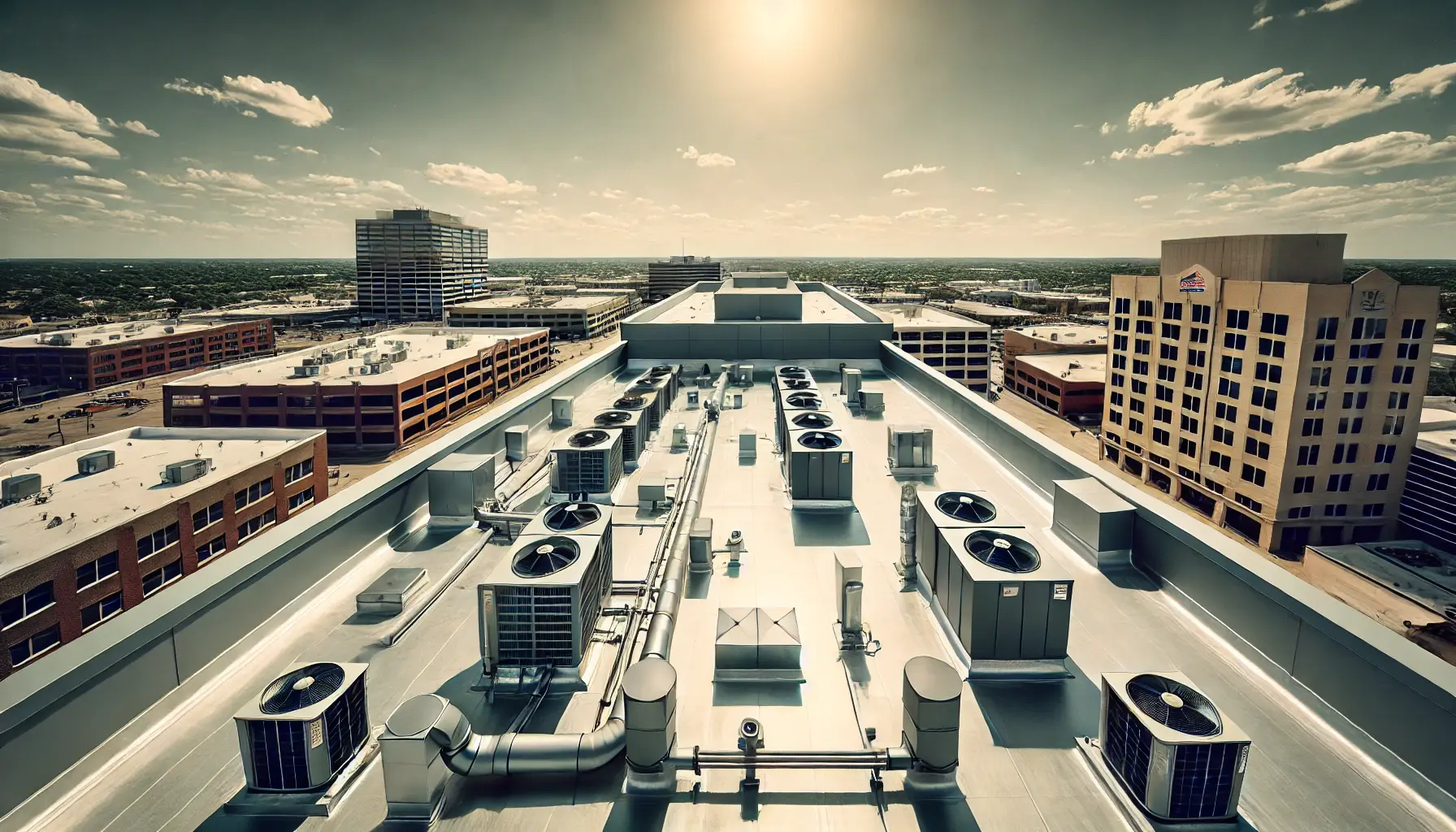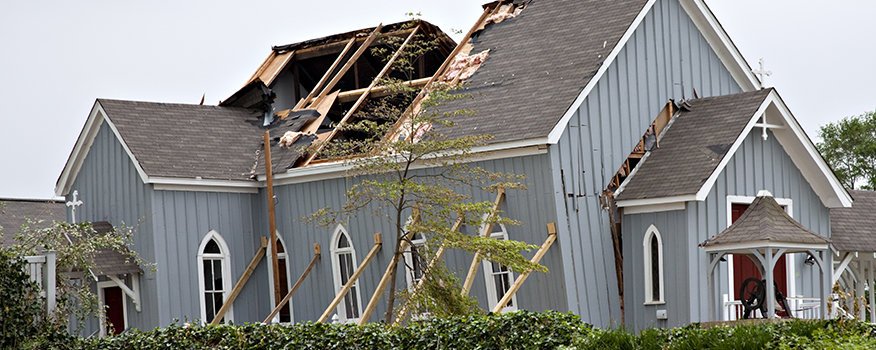Maintaining a commercial roof is one of the most critical yet often overlooked responsibilities of business ownership. Your roof is the first line of defense against weather and wear, protecting your building and its contents. Without proper care, even minor issues can spiral into expensive repairs or premature roof replacement.
For Wichita business owners, roof maintenance is particularly important due to the region’s unpredictable weather. From intense storms to extreme temperature shifts, the local climate can take a significant toll on commercial roofs. These factors make it essential to implement a proactive maintenance plan.
In this guide, we’ll outline key tips that will help you prevent expensive roof repairs and keep your commercial roof in top condition for years to come.
Key Takeaways:
- Know Your Roof Type: Understanding your specific roofing system—whether it’s flat, metal, shingle, or membrane—helps you tailor your maintenance plan for optimal care.
- Schedule Regular Inspections: Conduct biannual roof inspections to catch small issues before they become major problems. Professional inspections are vital for identifying hidden damage.
- Maintain Gutters and Drains: Keeping gutters and drainage systems clear prevents water buildup, leaks, and structural damage, especially during Wichita’s rainy seasons.
- Address Minor Damage Promptly: Quickly repair small issues, such as leaks or missing shingles, to avoid expensive, long-term repairs and roof replacements.
- Implement a Preventive Maintenance Program: Regularly scheduled maintenance extends the lifespan of your roof and reduces the likelihood of costly emergency repairs.
- Monitor for Weather-Related Damage: Wichita’s storms, hail, and tornadoes can cause significant roof damage. Conduct thorough inspections after severe weather to spot problems early.
- Consider Roof Coatings: Applying roof coatings improves waterproofing, energy efficiency, and UV protection, prolonging the life of your roof.
- Work with Trusted Roofing Professionals: Partner with an experienced roofing contractor, like Solid Rock Commercial Roofing, for quality inspections, repairs, and long-term roofing solutions.
1. Know Your Roof Type and Its Maintenance Needs
Understanding the type of roof you have is the first step in ensuring proper care. Each roofing system has its own set of challenges, and knowing what you’re dealing with allows you to focus on the right maintenance activities.
Common Commercial Roofing Materials
- Flat Roofs: Typically made from rubber membranes or modified bitumen, flat roofs are common in commercial buildings. They require frequent inspections to catch water pooling and debris buildup.
- Metal Roofing: Known for durability, metal roofs expand and contract with temperature changes, which can cause seams to loosen over time. Regular checks for rust and loose fasteners are key.
- Asphalt Shingles: While more common in residential properties, some small commercial buildings use shingles. These require inspection after storms to check for missing or damaged pieces.
- Membrane Roofs (TPO, EPDM, PVC): Popular for large commercial spaces, membrane roofs are prone to punctures and UV damage, which must be addressed regularly.
Example:
A warehouse in Wichita with a TPO membrane roof may experience water pooling after heavy rains. Addressing this quickly can prevent long-term damage, like leaks or compromised insulation.
Maintenance Tips for Each Roof Type:
- Flat Roofs: Check for standing water and debris buildup, especially after storms.
- Metal Roofs: Inspect for rust, seam separation, and loose fasteners.
- Asphalt Shingles: Look for missing, curled, or damaged shingles, particularly after strong winds.
- Membrane Roofs: Regularly inspect for punctures, cracks, or signs of UV damage.
2. Schedule Regular Roof Inspections
Routine inspections are crucial to catching small issues before they turn into big problems. Industry experts recommend inspecting your roof at least twice a year—typically in the spring and fall—to identify any issues caused by seasonal weather changes.
Why Regular Inspections Matter
Without regular inspections, minor roof damage often goes unnoticed until it becomes a major problem. For example, a small tear in the roofing membrane may seem insignificant but can lead to water infiltration, mold growth, and structural damage if left unaddressed.
What to Look for During an Inspection:
- Leaks or Water Stains: Check ceilings and walls for any signs of moisture inside the building.
- Cracks and Tears: Examine the roofing material for any cracks, splits, or punctures.
- Rust or Corrosion: Metal roofs may develop rust or corrosion, especially around seams and fasteners.
- Sagging or Uneven Areas: Sagging spots could indicate a structural issue or trapped moisture.
DIY vs. Professional Inspections
While it’s fine for business owners to perform a visual inspection for obvious issues, professional inspections are necessary to catch hidden problems. A professional roofing company like Solid Rock Commercial Roofing has the expertise and tools to detect underlying damage.
3. Keep Gutters and Drains Clean
Your roof’s drainage system plays a critical role in protecting its longevity. Clogged gutters and downspouts can lead to water backing up onto the roof, causing leaks, mold growth, and even structural damage if left unattended.
Importance of Proper Drainage
In Wichita’s rainy seasons, it’s especially important to ensure that your roof’s drainage system is functioning properly. Water that doesn’t drain correctly can pool on your roof, leading to leaks and weakened roofing materials.
Tips for Maintaining Gutters and Drains:
- Install Gutter Guards: These help keep leaves and debris from clogging your gutters.
- Regular Cleaning: Make sure to clear your gutters at least twice a year, especially in the fall and after storms.
- Inspect Downspouts: Ensure water is flowing freely away from your building’s foundation.
Example:
Imagine a Wichita shopping plaza owner neglecting their roof drainage system during the fall. After a storm, water backs up onto the flat roof, eventually finding a weak spot in the roofing membrane. What could have been prevented with a simple gutter cleaning now requires costly repairs.
4. Address Minor Damage Quickly
Delaying roof repairs is one of the most common mistakes business owners make. Small problems like a tiny leak or a few missing shingles may not seem urgent, but if they’re ignored, they can turn into major repairs—or worse, require a full roof replacement.
The Risks of Ignoring Minor Damage
Even seemingly insignificant issues like a loose seam or small puncture can allow moisture into the roofing system. Over time, this moisture can lead to mold, insulation damage, and structural weakening, all of which are far more expensive to fix than the initial issue.
Common Minor Roof Damages:
- Leaks: Leaks often go unnoticed until they cause visible interior damage.
- Damaged Flashing: Flashing protects roof seams, especially around chimneys, vents, and HVAC systems. Torn or missing flashing leaves the roof vulnerable to water damage.
- Missing Shingles: High winds common in Wichita can rip off shingles, exposing the underlayment to the elements.
Steps to Take When Damage is Found:
- Document the Damage: Take photos and note the location of the issue.
- Call a Professional Roofer: Contact a trusted contractor like Solid Rock Commercial Roofing to assess the damage and recommend repairs.
- Temporary Repairs: If necessary, apply a temporary fix to prevent further damage until a professional can perform a permanent repair.
Example:
Consider the owner of a local office building who notices a small tear in the roof membrane. Rather than addressing it immediately, they ignore the problem, assuming it won’t worsen. After a heavy storm, the tear expands, leading to water infiltration and interior leaks. A simple patch could have prevented the costly repairs now needed to replace damaged insulation and fix the interior walls.
5. Invest in a Preventive Maintenance Program
Prevention is key to keeping your roof in top shape and avoiding major repairs. A preventive maintenance program helps identify potential problems before they escalate, extending the life of your roof and saving you money in the long run.
What is Preventive Maintenance?
Preventive maintenance involves regular, scheduled upkeep designed to fix minor issues before they become serious problems. This approach helps catch damage early, preventing costly emergency repairs or premature roof replacement.
Key Components of a Preventive Maintenance Plan:
- Scheduled Inspections: Biannual inspections by professionals are critical to catching issues early.
- Routine Cleaning: Regularly clear the roof of debris that can lead to damage.
- Immediate Repairs: Address any issues found during inspections promptly to prevent escalation.
The Benefits of Preventive Maintenance:
- Cost Savings: Catching problems early reduces the risk of costly, unexpected repairs.
- Extended Roof Life: Regular care significantly extends the lifespan of your roof.
- Peace of Mind: Knowing your roof is in good shape gives you confidence that your business is protected from the elements.
6. Monitor for Weather-Related Damage
Wichita’s climate can be hard on commercial roofs, with frequent storms, heavy rainfall, and hail causing significant damage. After severe weather, it’s crucial to inspect your roof for any signs of damage that may not be immediately visible.
Wichita’s Weather and Roof Damage:
- Thunderstorms: Heavy rain and high winds can loosen shingles, tear membranes, and damage flashing.
- Tornadoes: Tornadoes can cause significant structural damage or rip roofing materials away entirely.
- Hail: Hailstorms can crack shingles, dent metal roofing, and puncture membranes, leading to long-term issues if not repaired.
Steps to Take After Severe Weather:
- Conduct a Visual Inspection: Check your roof for missing materials, damage, or debris from the ground.
- Inspect the Interior: Look for water stains or signs of leaks inside your building.
- Call a Professional Roofer: After major storms, schedule a professional inspection to assess any hidden damage.
Example:
After a major hailstorm in Wichita, the owner of a local retail building notices only minor dents on their metal roof. Assuming the damage is minimal, they don’t take action. However, over time, the dents compromise the roof’s protective coating, leading to rust and, eventually, expensive repairs that could have been prevented with prompt attention.
7. Consider Roof Coatings for Added Protection
Roof coatings offer a practical way to extend the life of your roof while improving energy efficiency and protection against the elements. Coatings can help waterproof your roof, reflect heat, and protect against UV damage, making them a smart investment for many business owners.
Benefits of Roof Coatings:
- Waterproofing: A roof coating seals small cracks and prevents water from seeping into the building.
- Energy Efficiency: Reflective coatings reduce heat absorption, lowering energy costs during Wichita’s hot summers.
- UV Protection: Coatings protect the roof from UV rays, which can weaken roofing materials over time.
Types of Roof Coatings:
- Reflective Coatings: Ideal for improving energy efficiency by reflecting sunlight away from the roof.
- Elastomeric Coatings: Provide a flexible, waterproof layer that expands and contracts with temperature changes.
When to Apply a Roof Coating:
Roof coatings are most effective when applied before significant damage occurs. They can also be reapplied periodically to maintain their protective qualities.
8. Choose a Trusted Roofing Professional
While business owners can handle some aspects of roof maintenance, many tasks require professional expertise. Partnering with an experienced, reputable roofing contractor ensures your roof gets the care it needs to stay in good shape for years to come.
Why the Right Contractor Matters:
- Expertise: A skilled contractor knows how to work with your specific roofing system and address local weather challenges.
- Licensing and Insurance: Make sure your roofer is fully licensed and insured to protect your business from liability.
- Warranties: Choose a contractor that offers warranties on both materials and workmanship for peace of mind.
Solid Rock Commercial Roofing: Wichita’s Local Expert
At Solid Rock Commercial Roofing, we pride ourselves on providing personalized service and high-quality craftsmanship. We understand the unique roofing challenges that Wichita businesses face and offer tailored solutions to keep your roof in top condition. With our commitment to sustainability and long-term durability, you can trust us to protect your investment.
Conclusion: Take Action to Protect Your Roof
Your commercial roof is a vital part of your building’s infrastructure, and regular maintenance is essential to avoid costly repairs and keep your roof functioning at its best. By understanding your roof type, scheduling inspections, addressing minor damage, and investing in preventive care, you can ensure your roof lasts for years to come.
Don’t wait until it’s too late—schedule a consultation with Solid Rock Commercial Roofing today. Our experienced team is ready to provide a free inspection and develop a maintenance plan tailored to your needs. Call us today at [Insert Phone Number] or visit our website to learn more.
Frequently Asked Questions:
How often should I inspect my commercial roof?
It’s recommended to inspect your commercial roof at least twice a year, typically in the spring and fall. Additionally, inspections should be done after major weather events like storms, hail, or high winds to identify any damage.
What are the most common signs of roof damage I should look for?
Common signs include leaks or water stains inside the building, cracked or missing roofing materials, rust on metal roofs, sagging areas, and clogged gutters or drains. These are indicators that your roof may need attention.
Can I inspect my commercial roof myself?
While you can perform basic visual inspections for obvious issues, it’s recommended to have a professional roofer conduct a thorough inspection. Professional roofers can detect hidden problems that are often missed during DIY inspections.
What can happen if I delay repairing minor roof damage?
Delaying small repairs can lead to bigger issues, such as water infiltration, mold growth, and structural weakening. What starts as a minor leak or crack can eventually result in much more costly repairs or even a full roof replacement.
How can I prevent water pooling on my flat roof?
Regularly clean gutters and drains to ensure proper water flow. Also, schedule routine inspections to identify and fix low spots or drainage issues that may cause water to pool on your flat roof.
What are the benefits of applying a roof coating?
Roof coatings provide added waterproofing, protect against UV damage, and improve energy efficiency by reflecting heat. They can also extend the lifespan of your roof by preventing wear and tear from the elements.
When should I consider replacing my roof instead of repairing it?
If your roof has extensive damage, has reached the end of its typical lifespan, or requires frequent repairs, it may be more cost-effective to replace it. A professional roofer can assess your roof and recommend the best course of action.
How can Solid Rock Commercial Roofing help with my roof maintenance?
Solid Rock Commercial Roofing offers comprehensive maintenance services, including inspections, repairs, roof coatings, and preventive maintenance plans. Our team is experienced in handling Wichita’s unique roofing needs, ensuring long-lasting protection for your commercial roof.
How do I get started with a maintenance plan for my commercial roof?
Contact Solid Rock Commercial Roofing to schedule a free roof inspection. Our team will assess your roof’s condition and develop a customized maintenance plan to keep your roof in top shape and prevent costly repairs.
This article has been a collaboration between Rusty Cryer and OpenAI’s ChatGPT. Created on September 12, 2024, it combines AI-generated draft material with Rusty’s expert revision and oversight, ensuring accuracy and relevance while addressing any AI limitations.




